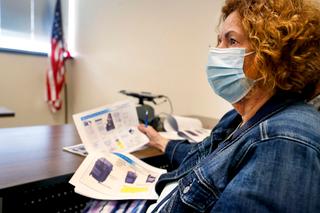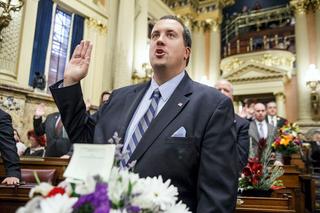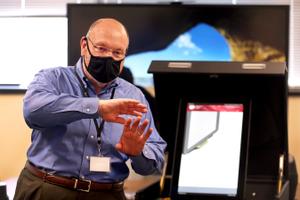This article is made possible through Votebeat, a nonpartisan reporting project covering local election integrity and voting access. This article is available for reprint under the terms of Votebeat’s republishing policy.
HARRISBURG — Among the most stressed-out folks in local government this week will be the former manager of the USA Field Hockey team, a congressman’s past chief of staff, and an ex-political science professor.
They’ll all be running elections in Pennsylvania for the first time during Tuesday’s primaries — and they will do it under the microscope of a skeptical GOP electorate galvanized by Republicans in the state legislature.
After what election directors described as a “nightmare” election in 2020 — in which huge changes to Pennsylvania’s voting process were complicated by the pandemic and partisan misinformation fueled by former President Donald Trump and his allies — at least 25 of their peers left their jobs.
Five months later, most of those positions have been filled, but not everyone has the same level of experience as their predecessors. For the newest election directors, their first real test will come Tuesday, when thousands of Pennsylvanians will cast a ballot in the primaries.
“The view from the consumer side of the counter, and the view from this side of the counter, is tremendously different,” said Bob Morgan, who started as Luzerne County election director a mere six weeks ago after leaving a job as U.S. Rep. Matt Cartwight’s chief of staff. “It’s a little bit like drinking from the firehose.”
Pennsylvania offers no formal or standardized training for election officials, and training from nongovernmental institutions such as universities and associations is limited across the country. New elections officials said they’ve relied on county staff to show them the ropes, as well as studied the guidance and directives from the Department of State.
“We’re not provided with a handbook or how-to guide when we start this job, which would be great,” Sullivan County Elections Director Hope Verlest said in January.
In the past two years, election officials have had to learn how to operate new electronic, paper-verifiable voting machines and implement major election law changes passed by the General Assembly, including no-excuse mail-in voting and earlier voter registration deadlines.
Many warned that the changes were too much, too fast. Other states took years to implement statewide mail voting; Pennsylvania directors had just a few months, and had to make sure everything went smoothly during a high-turnout, high-stakes presidential election.
The new crop of election directors — among them a funeral homeowner, a land acquisitions supervisor, and a nurse — as well as more veteran officials said standardized training covering the foundations of election administration would reduce mistakes.
An untrained staffer might, for instance, make an error programming the many races into the right districts on the ballots, Lehigh County Elections Director Tim Benyo said.
“You see more mistakes, more things that people aren’t aware of until after the fact,” Benyo said.
Tammy Patrick, a senior advisor with the voter rights group Democracy Fund, said having standardized training isn’t so much about avoiding mistakes as it is about ensuring elections are administered consistently, and each voter is treated the same, especially if the race is close.
“You never want the outcome of an election to be contingent upon something that an election official did or didn’t do,” Patrick said.

A focus for the GOP
Standardized training is emerging as a potential GOP priority as the party seeks to overhaul the state election code.
Republicans who control the General Assembly have scrutinized election directors since the general election, when many lawmakers repeated Trump’s false claims that the results of the presidential race were fraudulent and those who ran the elections were to blame. Those false claims fueled the deadly Jan. 6 riot at the U.S. Capitol.
During a four-month public review of the state’s election code, the Pennsylvania House State Government Committee examined every aspect of election officials’ jobs, from how they verify voter eligibility to how they store ballots after elections.
The exodus of directors, chief clerks, and assistant directors — at least 25 since January 2020, according to Jonathan Marks, the state’s deputy election director — alarmed some members of the committee.
At least 17 counties have replaced those election directors, Spotlight PA and Votebeat found. At least four new hires came from election departments in other Pennsylvania counties or other states.
The director position has remained vacant in two counties — Centre and Montgomery — since last year.
“[Losing] like ⅓ of the knowledge and experience is huge,” Rep. Clint Owlett (R., Tioga) said during one of the state government committee’s 10 meetings. “Having the next generation of election officials really trained, and hearing there’s no official or mandatory training is something I think we need to look at.”
Almost every state helps train local election officials, county clerks, registrars, or election boards in some way, according to the National Conference of State Legislatures. Some states, like Arizona, require election officials to attend a certification program — typically a series of state-provided classes over a period of a year or two — while others require continuing education courses or at the very least offer an annual or biannual training.
Two organizations, The Humphrey School of Public Affairs at the University of Minnesota and the National Association of Election Officials, offer a certificate in election administration. The latter also holds membership workshops, seminars, and conferences.
Pennsylvania’s election code gives the Secretary of the Commonwealth the ability to develop a “voluntary professional certification” and poll worker training programs for county election officials in consultation with local boards of elections, and it allows election officials to be compensated for participating in training.
A spokesperson for the Department of State told Spotlight PA and Votebeat the department has historically offered optional online and in-person training to county election officials and poll workers, often in conjunction with state and federal partners.
The spokesperson, Ellen Lyon, pointed to a section of the state code that gives county election boards — composed of county commissioners in most jurisdictions — the ability to “instruct election officers in their duties.” It’s unclear how many counties, if any, actually offer instruction.
Marks told the House State Government Committee in January that department staff provided in-person help to county election directors with the pilot post-election risk-limiting audits, which some counties were doing for the first time this year. He said he’s also offered to personally go over the job responsibilities with incoming election directors.
Pennsylvania election directors said they get together at regional conferences they put on themselves a couple times a year, but weren’t able to meet in 2020 because of the pandemic. Election directors said they also share advice and ask questions regularly through an email thread, and they have biweekly phone calls with the Department of State.

‘Middle ground’
A report published last week that summarizes the House’s election oversight meetings offers suggestions that echo the GOP’s desire to make election administration uniform across all 67 counties, something Republicans said didn’t happen last year.
Counties differed in the number of drop boxes and satellite voting locations they provided for people to cast ballots by mail, and the localities diverged when it came to allowing voters to fix mistakes on their mail ballot envelopes.
“Confidence in Pennsylvania’s election process would be strengthened by increased training of election administrators and clearer, uniform guidelines on transparency in election operations,” committee Chairman Seth Grove (R., York) wrote, adding Pennsylvania could benefit from having a training manual or standard rulebook, similar to Arizona’s.
Grove’s report also includes ideas such as requiring signature verification for all mail ballots and implementing stricter voter ID rules. Any legislation will have to be negotiated with Democratic Gov. Tom Wolf, whose staff told the Associated Press earlier this month that he would oppose changes to the state’s voter ID law.
Grove told the Philadelphia Inquirer last week he hopes to negotiate with Wolf’s office and others before writing legislation that could be introduced as soon as this month.
Election directors are now anxiously waiting to see what changes lawmakers propose.
Benyo, from Lehigh County, said he hopes lawmakers get to a “middle ground” and adopt changes that benefit voters and make election directors’ jobs easier without letting politics get in the way.
“Right now we’re kind of in a weird place, an uncharted territory where voters believe what they want to believe or believe some things that are not necessarily true, and that’s not good for the whole process,” he said.
WHILE YOU’RE HERE… If you learned something from this story, pay it forward and become a member of Spotlight PA so someone else can in the future at spotlightpa.org/donate. Spotlight PA is funded by foundations and readers like you who are committed to accountability journalism that gets results.
